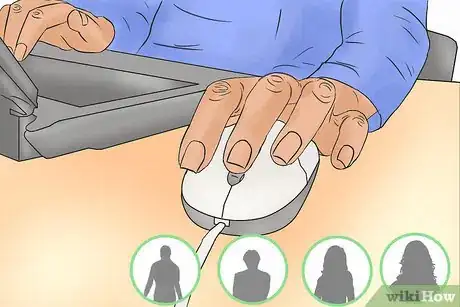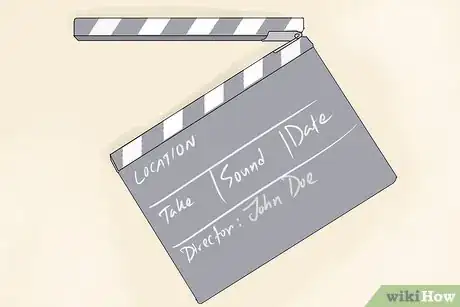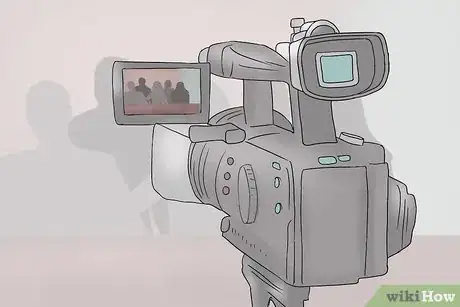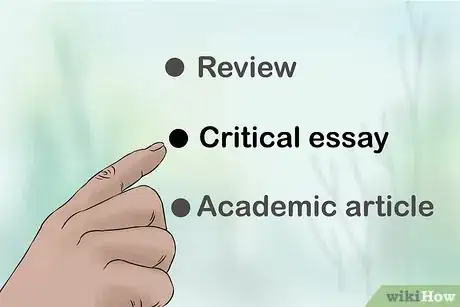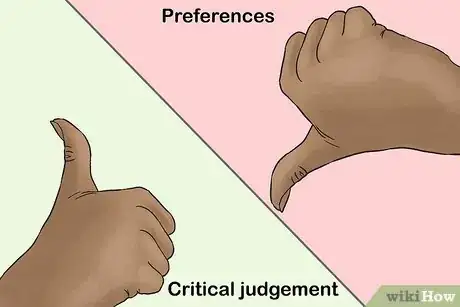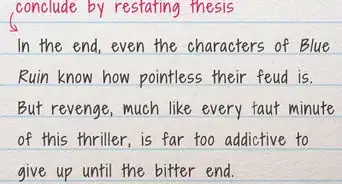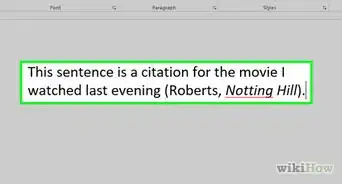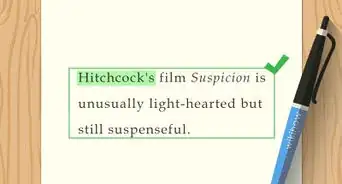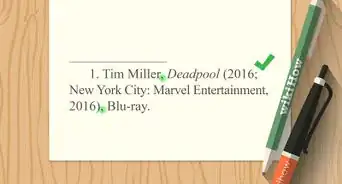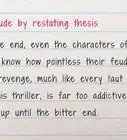This article was co-authored by wikiHow Staff. Our trained team of editors and researchers validate articles for accuracy and comprehensiveness. wikiHow's Content Management Team carefully monitors the work from our editorial staff to ensure that each article is backed by trusted research and meets our high quality standards.
There are 7 references cited in this article, which can be found at the bottom of the page.
This article has been viewed 171,048 times.
Learn more...
Film critics study movies, provide insightful commentary, and let us know whether a movie is a success or a flop. Whether you want to be a professional or hobbyist film critic, you must first possess a passion for film. Watching as many films as you can and reading the work of other critics is key for your development as a film critic. As with any craft, practice is crucial. Practice writing film criticisms as often as you can. Continue to sharpen your writing skills, because these are central to the film critic’s job. With enough practice and passion, you might even become a professional film critic!
Steps
Learning about Film
-
1Cultivate a passion for film criticism. It’s hard to make it as a big-time film critic. Many critics work hard for years before earning any money at all. Moreover, many critics write film reviews as a hobby, simply because they love film. Film criticism takes a lot of time and effort, and a steady income is not guaranteed, so passion is key.[1]
- A passion for film criticism will show through in your work.
-
2Watch a variety of quality films. If you want to critique films, you need to know what makes a quality film. Look for critically acclaimed films across all the different genres, and watch them. Consider classic films, indie films, foreign films, short films, animated films, comedies, and dramas.[2]
- Be sure to watch as many “classic films” as you can--film critics often reference these. Search “classic films” online to find a number of lists.[3]
- Purchasing a subscription to a streaming service like Netflix is a great way to get access to a wide variety of films.
Advertisement -
3Read the work of other film critics. Reading the work of established film critics will help you gain a better understanding of film critic writing and film as an art form. Find a few critics who you really like, and follow their work.[4]
-
4Make some films of your own. A good understanding of filmmaking and video editing is important to being a good film critic. Making a few short films of your own, whether they are 5 minutes long or an hour long, can help inform your interpretation of others’ films.[7]
Gaining Experience
-
1Study journalism. The majority of film critics are journalists who end up specializing in film writing. If you are in college, consider majoring or minoring in journalism. Otherwise, you can take a journalism class at your local community college or online.[8]
- You don’t need to study journalism to become a film critic, but it’s helpful if you want to make a career out of film criticism.[9]
-
2Take some film classes. Try taking some film classes at your school, online, or at your local community college. Majoring or minoring in film can be helpful if you are looking to be a professional film critic.
-
3Start a film blog. The two major routes to becoming a film critic are through the field of journalism, and through film blogging. Film critics often start film critique blogs for pleasure. A blog can be a stepping stone to a career in film criticism. Your blog will allow you to practice your writing skills and create a portfolio of your work.[10]
- Don’t be shy when it comes to expressing your opinion on your blog. Your content should be high quality, but also honest and genuine.[11]
-
4Publish your commentary. If film criticism is a hobby, you might be happy publishing your work on your film blog alone. However, if you are trying to become a professional film critic, you should send your work to newspapers, magazines, and online publications to try your hand at getting published.[12]
- While jobs with print media are becoming more scarce, digital media offers a wide range of new opportunities.
- Getting published is difficult, so don’t give up! It may take years of practice, so keep blogging, reading the work of other film critics, and studying film.
-
5Apply for jobs as a film critic. After you have built up a portfolio with your blog and maybe even gotten a few pieces published, you can start applying for jobs as a film critic. You might be interested in freelance work, in which a business or individual hires you for a particular project. You can also apply for jobs at movie review websites and other digital and print publications.[13]
- There are many freelance job sites online. Take some time to look at the listings to see if a project interests you.
- This will probably be a side job, at least initially. Many positions are part time, and likely won’t pay enough to be your only source of income.
Thinking Like a Film Critic
-
1Learn about the different forms of criticism. There are different forms of film criticism. The most common form is the review, which acts as a recommendation or warning for people who haven’t yet seen the film. These are a few hundred words and focus on evaluating the film--saying whether it is excellent, good, mediocre, or poor.[14]
- An academic article is more formal than a review, and much longer. It is less focused on opinion, and assumes the reader has seen the film.
- A critical essay is less formal and more opinionated than an academic article, but more formal than a review.
- Don’t feel pressured to choose a particular form of criticism and stick to it. Many film critics write in all three forms, or blend different forms!
-
2Analyze the film. A film critic should not merely describe the plot, scenes, music, and style of the film they are studying, but also be able to analyze these elements. To analyze a film, think about how different elements work together and the effect they produce.[15]
- For example, you might observe that a director uses a lot of dark colors in his film. Through analysis, you might conclude that this use of color mirrors the dark emotions of the main character.
- Critical essays and academic articles focus on description and analysis, while reviews usually do not.
-
3Interpret the film. A critic should be able to interpret a film, or determine its meaning. Think about the claims a film is making. What message is the director trying to convey? Different critics may have different interpretations of the same film.[16]
- A film critic might interpret the film Snow White as a commentary on the pitfalls of vanity.
- Critical essays and academic articles offer interpretations, whereas reviews sometimes do, but often don't.
-
4Evaluate the film. Evaluation is the most important aspect of a movie review. When you evaluate a film, you make a judgment about its quality. Is it an excellent film, a mediocre film, or a bad film? Base your evaluation on your understanding of film as an art form.[17]
- A critic might offer the evaluation that Snow White is one of the best animated films of its time.
- Reviews focus heavily on evaluation, while critical essays and academic articles place less emphasis on evaluation.
-
5Distinguish between preferences and critical judgement. You may like a film, but as a critic, recognize that it is not a high quality film. In the same way, you may not enjoy a film, but acknowledge it is well made. When writing as a critic, it’s important to make judgments about film quality rather than relying on your own tastes.[18]
- You should base your judgments on general criteria for excellence. These include originality, good acting, technical skill, an engaging plot, and emotional intensity. Reading the work of other critics and watching high quality films will give you a better idea of what makes an excellent film.
- It’s fine to let your tastes show through in movie reviews--many critics do. Celebrity critics are often famous for displaying their preferences. Just make sure you are looking at the film with a critical eye, too.
Writing Like a Film Critic
-
1Learn how to write well. Writing is at the heart of film criticism, because writing is how a film critic conveys their ideas. Make sure you have a sound understanding of organization, grammar, and style.[19] Reading great works of literature, as well as the works of your favorite film critics, is an important step in learning to write well.[20]
- Formal training in writing is not necessary, but it can help. Many employers, particularly those in mainstream media, look for film critics with a background in journalism or communication. Consider taking writing classes at your school, university, or local community college.[21]
-
2Develop a guiding philosophy. Every film critic should offer a unique perspective on cinema that guides their work. This perspective should extend beyond individual films, and instead focus on how film as a whole relates to art, society, or politics.[22]
- Some critics believe that film can offer guiding wisdom to help people live better lives. Others believe that every film element has a significant symbolic value. To develop your own guiding philosophy, think about what film means to you as an art form and how it relates to life.
-
3Be honest. Be honest in your critiques of films. Don’t bash a film just for dramatic effect. At the same time, don’t be afraid to speak out against a film that other critics have praised.[23]
-
4Use simple language. People read film critiques for the ideas and opinions they contain, not for artistic writing style. While your pieces should be well written, avoid using flowery language or technical jargon, which can detract from clarity.[24]
-
5Critique yourself. While you’ll be constantly offering critiques of others’ work, you should always remain critical of your own. Try to find the weaknesses in your arguments, and address them. A finished critical piece should be the product of multiple drafts.[25]
Community Q&A
-
QuestionHow should I dress as a film critic?
 Rod GustafsonCommunity AnswerIf you're referring when you attend screenings, pretty much anything goes. Typically dress is casual. If you work for a specific media outlet, you'd go by their dress code. TV people typically are running to their next "thing" so they often show up looking a little more dapper than other media types.
Rod GustafsonCommunity AnswerIf you're referring when you attend screenings, pretty much anything goes. Typically dress is casual. If you work for a specific media outlet, you'd go by their dress code. TV people typically are running to their next "thing" so they often show up looking a little more dapper than other media types. -
QuestionAlongside watching lots of movies and reading other critics, are there any other sources I should/may read so that I have a wider understanding of the art before I step in?
 TorpiTop AnswererThere are a lot of books about writing film criticism - you could try one or more of these. "A Short Guide to Writing about Film" by Timothy Corrigan is a good place to start. You should also learn about film history, and various film movements - "Film History: An Introduction" by Bordwell and Thompson is used at a lot of universities, although it isn't a very exciting read.
TorpiTop AnswererThere are a lot of books about writing film criticism - you could try one or more of these. "A Short Guide to Writing about Film" by Timothy Corrigan is a good place to start. You should also learn about film history, and various film movements - "Film History: An Introduction" by Bordwell and Thompson is used at a lot of universities, although it isn't a very exciting read.
Warnings
- Making a career out of film criticism is challenging. Be prepared to dedicate a lot of time to your craft, work hard, and make sacrifices.⧼thumbs_response⧽
References
- ↑ https://www.nyfa.edu/student-resources/how-to-become-a-film-critic-with-robert-ager/
- ↑ https://www.nyfa.edu/student-resources/how-to-become-a-film-critic-with-robert-ager/
- ↑ http://www.bbc.co.uk/programmes/articles/2Zpj4YL3HK8YmS71C0lk2fG/ali-plumbs-guide-to-becoming-a-film-critic
- ↑ https://www.nyfa.edu/student-resources/how-to-become-a-film-critic-with-robert-ager/
- ↑ http://www.bbc.co.uk/programmes/articles/2Zpj4YL3HK8YmS71C0lk2fG/ali-plumbs-guide-to-becoming-a-film-critic
- ↑ http://www.bbc.co.uk/programmes/articles/2Zpj4YL3HK8YmS71C0lk2fG/ali-plumbs-guide-to-becoming-a-film-critic
- ↑ https://www.nyfa.edu/student-resources/how-to-become-a-film-critic-with-robert-ager/
- ↑ http://www.academicinvest.com/arts-careers/film-studies-careers/how-to-become-a-film-critic
- ↑ http://www.academicinvest.com/arts-careers/film-studies-careers/how-to-become-a-film-critic
- ↑ http://www.academicinvest.com/arts-careers/film-studies-careers/how-to-become-a-film-critic
- ↑ http://www.bbc.co.uk/programmes/articles/2Zpj4YL3HK8YmS71C0lk2fG/ali-plumbs-guide-to-becoming-a-film-critic
- ↑ http://www.academicinvest.com/arts-careers/film-studies-careers/how-to-become-a-film-critic
- ↑ http://www.makeuseof.com/tag/how-to-write-a-movie-review-online-and-earn-money-doing-it/
- ↑ http://www.davidbordwell.net/blog/2008/05/14/in-critical-condition/
- ↑ http://www.davidbordwell.net/blog/2008/05/14/in-critical-condition/
- ↑ http://www.davidbordwell.net/blog/2008/05/14/in-critical-condition/
- ↑ http://www.davidbordwell.net/blog/2008/05/14/in-critical-condition/
- ↑ http://www.davidbordwell.net/blog/2008/05/14/in-critical-condition/
- ↑ https://www.ukfilmreview.co.uk/become-a-film-critic
- ↑ https://learning.blogs.nytimes.com/2012/09/20/writing-rules-advice-from-the-new-york-times-on-writing-well/?_r=0
- ↑ http://www.academicinvest.com/arts-careers/film-studies-careers/how-to-become-a-film-critic
- ↑ https://www.nyfa.edu/student-resources/how-to-become-a-film-critic-with-robert-ager/
- ↑ https://www.nyfa.edu/student-resources/how-to-become-a-film-critic-with-robert-ager/
- ↑ https://www.nyfa.edu/student-resources/how-to-become-a-film-critic-with-robert-ager/
- ↑ https://www.nyfa.edu/student-resources/how-to-become-a-film-critic-with-robert-ager/
About This Article
To be a film critic, start by watching as many classic films as you can across all genres, so that you can see what makes a quality film. Then, read the work of established film critics to get a better understanding of the things to analyze in a movie. Additionally, try making a few short films of your own to learn about video editing and give you a basis for critiquing other films. You can also take film classes online or at a community college to bring your commentary to the next level before having your work published or applying for a job as a critic. For advice on how to develop your own guiding philosophy for critiquing movies, read on!


